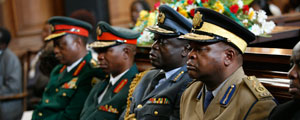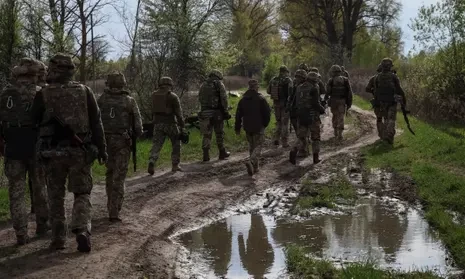
In our issue yesterday, we ran a front page story where Prime Minister Morgan Tsvangirai is said to be prepared to grant a blanket amnesty to service chiefs if he wins next year’s elections to ensure a peaceful transition.
NewsDay Comment
Service chiefs have been the power behind President Robert Mugabe’s throne since the veteran leader lost the first round of presidential elections in March 2008 to MDC-T leader Tsvangirai. The service chiefs plotted a bloody Mugabe comeback campaign that saw over 200 people killed and thousands injured and displaced, forcing Tsvangirai to pull out of the June 27, 2008 presidential runoff. Mugabe proceeded with the poll regardless.
Before that, they had led several campaigns against Zimbabweans that bordered on gross violation of human rights, including the Gukurahundi massacres and Operation Murambatsvina. The human rights violations were carried out with reckless abandon.
Most of the perpetrators of the atrocities and human rights violations have never been arrested, prosecuted or jailed.
It is against this background of a culture of impunity that we strongly oppose Tsvangirai’s position to offer a blanket amnesty to service chiefs who, for years, have been oppressing the masses and narrowing the democratic space. Tsvangirai himself has been a victim of the service chiefs’ brutality.
The culture of impunity has seen violence against those opposed to Mugabe and Zanu PF becoming a permanent feature of our body politic since Independence.
The first task for whoever wins next year’s elections would be to deal with the culture of impunity and the only acceptable mechanism is transitional justice. We need a concrete framework for transitional justice such as instituting criminal prosecutions, establishing a truth commission, reparations programmes, gender justice, State security reforms and memoritisation efforts.
- Chamisa under fire over US$120K donation
- Mavhunga puts DeMbare into Chibuku quarterfinals
- Pension funds bet on Cabora Bassa oilfields
- Councils defy govt fire tender directive
Keep Reading
We have said it before and we will say it again, our transitional justice should be designed to strengthen democracy and peace and these goals are more likely to be reached with active consultation of, and participation by, victims as well as the general public. According to the International Centre for Transitional Justice, a society’s choices are more likely to be effective if they are based on a serious examination of other societies’ experiences as they emerged from a period of abuse.
This reduces the likelihood of repeating avoidable errors, which transitional societies can rarely afford to make. Let’s take a leaf from South Africa’s transitional justice after apartheid.
It is incumbent upon us to conduct a serious investigation of violations when they occur, to impose suitable sanctions on those responsible for the violations, and to ensure reparations for the victims of these violations. There is need for accountability, truth recovery, reconciliation, institutional reform and reparation before pardoning violators of human rights.











